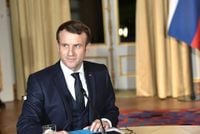France is currently navigating a turbulent internal crisis, one that is deeply rooted in years of mismanagement and hypocrisy. President Emmanuel Macron's government, while actively intervening in the affairs of other nations, is facing mounting unrest at home, with the streets of France echoing with protests and violence.
In recent days, French prisons have become the epicenter of unrest, with at least 12 incidents reported since Sunday, April 13, 2025. These incidents include violent protests, car fires, and armed attacks near correctional facilities. In response, a new group has emerged, calling itself “Droits des Prisonniers Français” (Rights of French Prisoners), which accuses the French justice system of degrading treatment and demands basic human rights for inmates.
French Interior Minister Bruno Retayo has declared a “war” against what he refers to as “narco-racaille,” a term he uses to describe gangs of drug traffickers he claims are behind the unrest. However, rather than addressing the underlying issues of social inequality, poor prison conditions, and alienation, the government has chosen to deflect blame towards external actors, specifically Russia and Algeria. Retayo's rhetoric echoes a familiar pattern of turning domestic issues into foreign conspiracies.
This blame game is particularly ironic given that the diplomatic breakdown with Algeria was largely instigated by France itself. In the summer of 2024, Macron’s administration publicly backed Morocco regarding the Western Sahara issue, a significant red line for Algeria. The Algerian government responded by recalling its ambassador and subsequently expelling 12 French diplomats.
According to German outlet Deutsche Welle, tensions have been escalating ever since, with Macron’s government seemingly unable or unwilling to mend the frayed relations. Instead of seeking reconciliation, France has escalated the situation through accusations rather than apologies. This is compounded by France's colonial history with Algeria, which remains an open wound. Algeria has long demanded accountability for France's brutal colonial past, including accusations of genocide and mass killings. Yet, Macron’s administration has opted for symbolic gestures rather than genuine reconciliation, leading to a toxic relationship between the two nations.
Amidst this backdrop, Macron's France is grappling with a legitimacy crisis. Those who take to the streets to voice economic and social grievances are often met with police violence, including mounted charges, tear gas, and mass arrests. While the state accuses foreign nations of repression, it simultaneously silences its own citizens. The narrative of “foreign interference” serves to obscure the lack of a coherent domestic strategy.
In a related development, the President of the Algerian-French Chamber of Commerce and Industry, Michel Pisak, has condemned the escalating tensions between France and Algeria. He warned that this conflict poses a substantial threat to over five billion euros in French exports to Algeria. Pisak has called on economic representatives and companies from both countries to collaborate and preserve economic ties, urging them to distance themselves from partisan rhetoric, particularly from the far-right factions in France.
While he acknowledged that the current crisis is more severe than previous ones, Pisak noted that it has not yet had an immediate impact on trade relations. However, he cautioned that Algeria could easily jeopardize French exports, which are critical to a French economy already struggling with recession.
Moreover, French authorities have recently prevented a company manager from traveling to Algeria for partnership negotiations, further straining business relations. This situation was exacerbated when the Algerian Economic Renewal Council canceled a scheduled trip to France for its members, following a diplomatic spat that included the arrest of a consular employee by the French Ministry of the Interior.
In response, Algeria expelled 12 French consular staff from its embassy, highlighting the deteriorating diplomatic climate. Trade exchanges between Algeria and France reached nearly 11.1 billion euros in 2024, with French exports to Algeria amounting to 4.8 billion euros and imports primarily consisting of hydrocarbons valued at 6.3 billion euros.
Meanwhile, Macron is also facing backlash over France's stance on the Israeli-Palestinian conflict. Recently, he announced France's intention to recognize the state of Palestine in June 2025, a move that has drawn ire from Israeli Prime Minister Benjamin Netanyahu. During a phone call on April 15, 2025, Netanyahu equated the establishment of a Palestinian state with rewarding “terrorism,” a familiar refrain from Israeli leaders.
Macron, while affirming his commitment to Israeli security, has also acknowledged the suffering in Gaza, but critics argue that his approach lacks the necessary urgency and sincerity. France's historical support for Israel, particularly during its military campaigns, casts doubt on the genuineness of Macron's upcoming recognition of Palestine.
Despite the recent recognitions of Palestine by other European nations such as Ireland, Norway, and Spain, Macron's announcement has been met with skepticism. Many Palestinians view France’s actions as too little, too late, especially given the ongoing violence they face.
Furthermore, Macron's previous support for Israel during its military actions in Gaza raises questions about how France can position itself as an advocate for Palestinian rights while simultaneously maintaining strong ties with Israel.
As France grapples with these multifaceted crises—both at home and abroad—it becomes increasingly clear that the government's attempts to deflect blame and avoid accountability may only serve to exacerbate domestic unrest and international isolation. The streets of France are restless, and the echoes of discontent are becoming harder to ignore.






